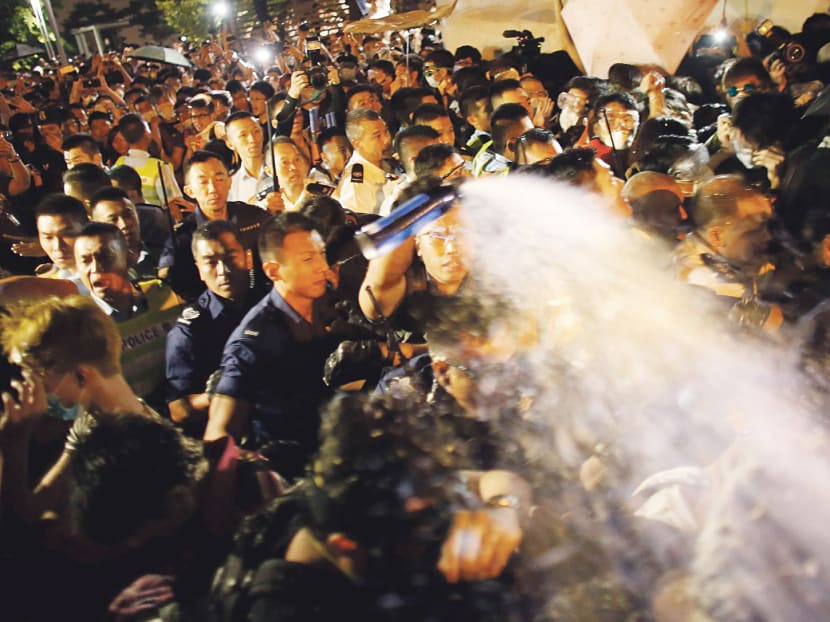HK leader hopes for fresh talks after night of clashes
HONG KONG — Hong Kong leader Leung Chun-ying yesterday sought to defuse the tension with pro-democracy protesters, saying he hoped the two sides can talk next week, but anger over police violence and continued street scuffles suggest the students are not about to give up.

Police officers use pepper spray in the early hours of yesterday to stop protesters from blocking a major road near Mr Leung’s office. Photo: REUTERS
HONG KONG — Hong Kong leader Leung Chun-ying yesterday sought to defuse the tension with pro-democracy protesters, saying he hoped the two sides can talk next week, but anger over police violence and continued street scuffles suggest the students are not about to give up.
Mr Leung was speaking after more than two weeks of protests that have paralysed parts of the city and grabbed global headlines amid scenes of violent clashes and tear gas rising between some of the world’s most valuable office buildings.
The protesters have taken over major roads and streets in business and shopping districts across the city since Sept 28. Mr Leung did not directly respond to questions about when the police will move in to clear the sites, though he said that while the authorities had tolerated the civil disobedience movement until now, it “cannot go on indefinitely”.
“Going forward, we cannot allow the occupying of streets to have a negative impact on Hong Kong society. The police will use appropriate methods to deal with this problem,” he said.
The protesters are demanding free elections for their leader in 2017, but Beijing insists on screening candidates first and Mr Leung reiterated that the government was unwilling to compromise. Doubts remain, however, over whether the proposed meeting can overcome the vast differences between the protesters and a Hong Kong administration that has been given little room to move by the central government in China.
“We don’t find civil nomination in all Western democracies either,” Mr Leung said when a reporter challenged him on how the talks could progress when he was ruling out any changes to the electoral framework.
Mr Alex Chow of the Hong Kong Federation of Students welcomed Mr Leung’s offer but criticised the government for setting preconditions. Many other demonstrators gathered in the main protest zone echoed his view.
“I paid attention to what (Mr Leung) said, but I couldn’t find anything constructive. He didn’t say anything new and I don’t think it is going to break this deadlock,” said Tong Wing-ho, 26.
Chief Secretary Carrie Lam cancelled talks with student leaders earlier this month, saying it was impossible to have a constructive dialogue.
Mr Leung spoke as posters depicting him as a fanged wolf, a gang boss and Hitler stared down from the walls of government headquarters and Legislative Council building in Admiralty, next to the Central business district, the epicentre of the protest movement.
In the early hours of yesterday, the police used pepper spray to stop protesters from blocking a major road near Mr Leung’s office amid public anger over the police beating and kicking, captured on video, of a protester a day earlier. At police headquarters in the entertainment district of Wan Chai, hundreds of people gathered outside to express outrage at the beating, with dozens queuing to lodge formal complaints.
The authorities yesterday said seven police officers who might have been involved in the beating of Mr Ken Tsang Kin-chiu, a member of the pro-democracy Civic Party, would be suspended, while Mr Tsang said he planned to file private legal action against those involved and would be asking the police department for the names of the officers.
Mr Tsang was taken to hospital after the beating, and activists released photographs showing bruising on his face and body. Footage of the beating went viral globally and injected fresh momentum into the protest, which had been flagging after nearly three weeks of demonstrations.
A few hundred protesters were yesterday camped out around the main protest site in Admiralty, where the atmosphere was calm. At its peak, 100,000 protesters had been on the streets, presenting China with one of its biggest political challenges since it crushed pro-democracy demonstrations in and around Tiananmen Square in Beijing in 1989.
China rules Hong Kong under a “one country, two systems” formula that gives the city wide-ranging autonomy and freedoms not enjoyed in mainland China, with universal suffrage an eventual goal.
But Communist Party rulers, fearful that demands for democracy might spread to the mainland, said only candidates vetted by a nominating committee would be able to contest a full city-wide vote to choose the next Chief Executive in 2017. AGENCIES





